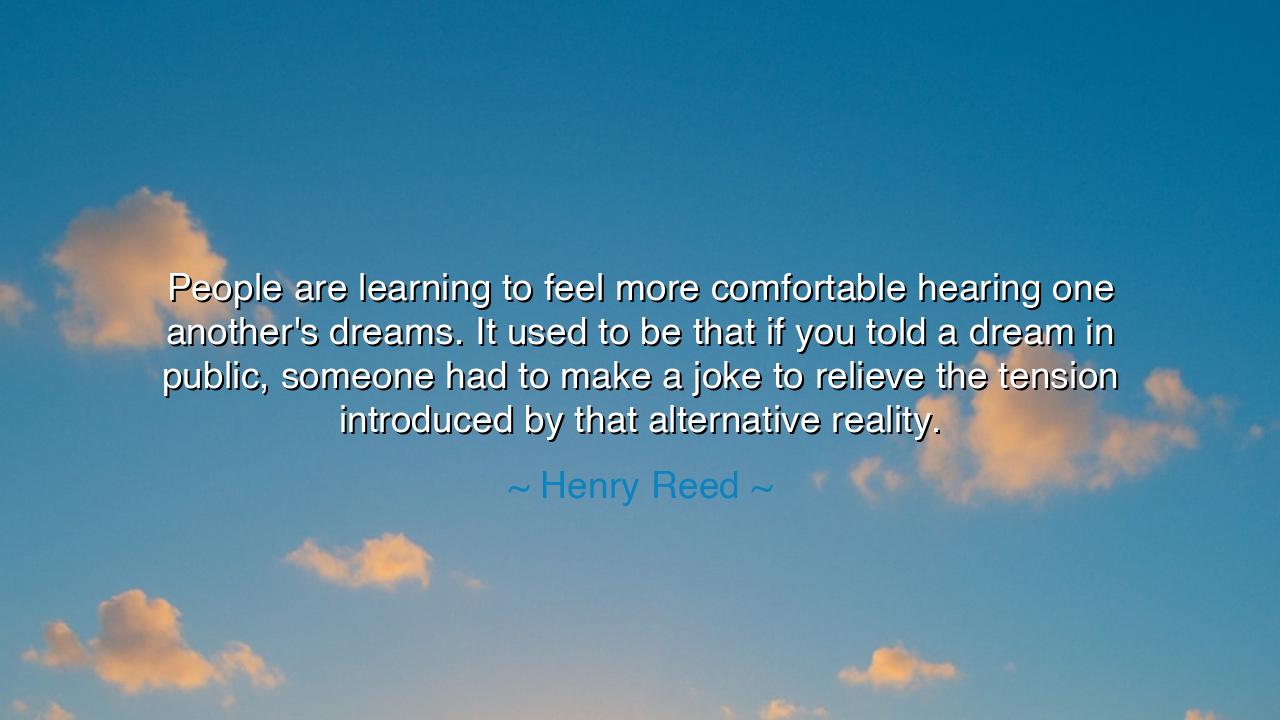
People are learning to feel more comfortable hearing one
People are learning to feel more comfortable hearing one another's dreams. It used to be that if you told a dream in public, someone had to make a joke to relieve the tension introduced by that alternative reality.






The words of Henry Reed reach to us like a voice from the borderlands between sleep and waking: “People are learning to feel more comfortable hearing one another’s dreams. It used to be that if you told a dream in public, someone had to make a joke to relieve the tension introduced by that alternative reality.” In this observation, Reed captures not only a shift in culture, but a deeper truth about the human spirit — our growing willingness to embrace the mysterious, the vulnerable, and the symbolic parts of our inner life. He speaks of dreams, but he might as well be speaking of the human soul itself — for dreams are the purest speech of the unconscious, the hidden self that dares to speak only in the dark.
In times past, to share a dream was to expose a piece of one’s inner world, naked and unguarded. The ancients understood the power of this. Among the Babylonians and the Egyptians, dreams were not trifles; they were divine messages, pathways between mortals and gods. Yet in the modern age — when reason claimed dominion over mystery — dreams came to be treated with suspicion, even embarrassment. Reed reminds us that when one dared to tell a dream aloud, it would stir tension, for it introduced what he calls an “alternative reality” — a space where logic falters, symbols live, and truth wears masks. In the unease of that revelation, people would laugh, not out of cruelty, but from discomfort — a nervous gesture to dismiss what they did not understand.
But now, he says, something has begun to change. “People are learning to feel more comfortable hearing one another’s dreams.” This is no small thing. It signals a collective softening of the human heart, a willingness to listen not only to facts, but to meanings; not only to the day’s demands, but to the night’s whisperings. When we listen to another’s dream, we are not merely hearing their story — we are entering the sacred temple of their imagination, their fears, their desires, their unspoken truths. To share dreams is to share the hidden language of the soul. Reed’s words reveal a movement toward empathy, a rediscovery of the ancient art of listening to what lies beneath words.
Consider the ancient Greek philosopher Artemidorus, who wrote Oneirocritica, the first great book on dream interpretation. He traveled from city to city collecting people’s dreams, treating them not as curiosities but as reflections of their lives and destinies. To him, the telling of a dream was a moment of revelation — a bridge between human experience and cosmic order. And yet, over centuries, such reverence faded. The Enlightenment scorned dreams as superstition, and industrial modernity silenced the inner voice in favor of machines and schedules. Reed’s quote reminds us that humanity is now returning to balance — learning again that the irrational has its wisdom, and that mystery, far from threatening us, can deepen our connection to one another.
When Reed speaks of the “tension introduced by that alternative reality,” he touches on the unease that arises whenever truth comes in unfamiliar form. A dream disrupts the tidy order of the rational mind. It speaks in metaphor, in wild imagery, in paradox — the language of poets and prophets. To listen to someone’s dream, then, is to stand humbly before mystery. It requires patience, imagination, and faith. To mock the dream is to flee from the unknown; to honor it is to grow wiser in the ways of the spirit. As the poet once said, “The dream is the hidden door to the innermost sanctuary of the soul.” Reed’s vision is of a world courageous enough to walk through that door together.
There is a lesson here not only for psychologists or philosophers, but for all who seek to understand the human heart. To share a dream is to share one’s vulnerability, to speak in a language unguarded by reason. When another listens — truly listens — they affirm that vulnerability as sacred. In such exchanges, understanding deepens, empathy awakens, and the old walls of isolation begin to fall. In learning to listen to dreams, we are learning also to listen to one another — not merely to the words we speak, but to the meanings we carry within.
And so, my children, let this be your lesson: do not fear the dreams of others, nor your own. When someone dares to share the strange, the symbolic, the wild story of their inner world, listen with the reverence you would give a sacred text. Do not laugh to ease your discomfort — breathe instead, and allow the mystery to unfold. For dreams, both sleeping and waking, are the bridges between souls. To speak them is to reveal the soul’s poetry; to hear them is to accept another’s heart. In doing so, we recover what the modern age forgot: that truth has many languages, and the language of dreams is one of the oldest, deepest, and most beautiful of all.






AAdministratorAdministrator
Welcome, honored guests. Please leave a comment, we will respond soon